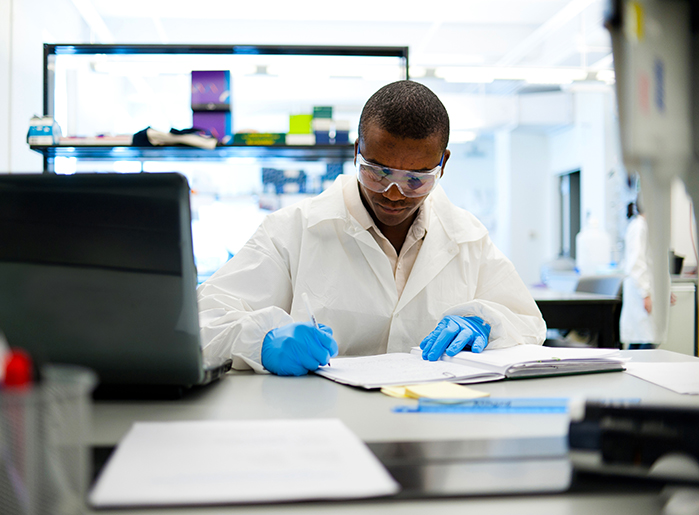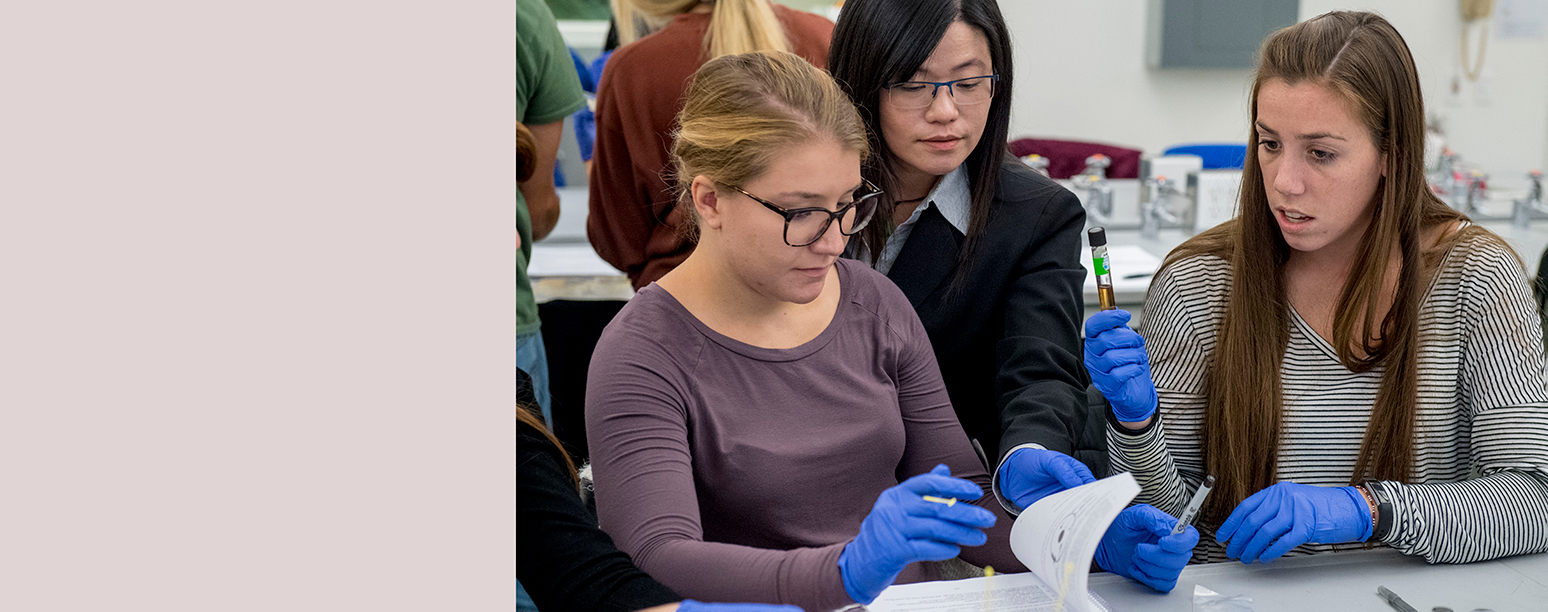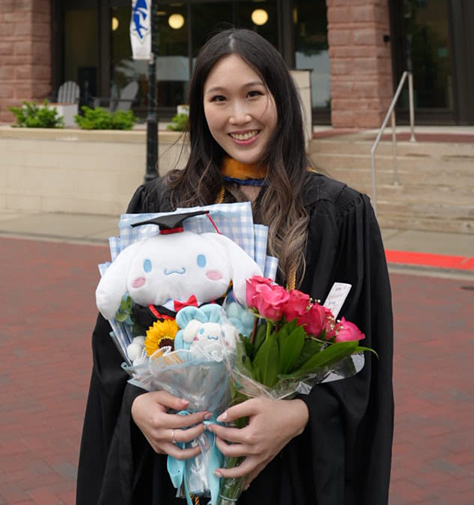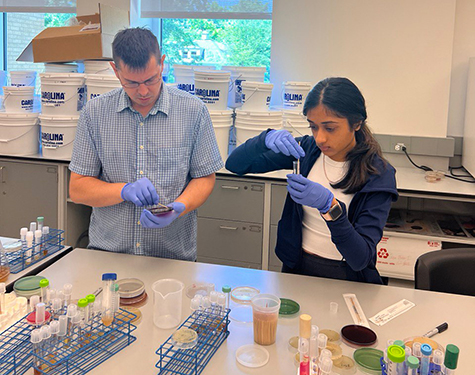College of Arts and Sciences
Whether you’re drawn to research, academia, teaching or business, our S.T.E.M.-designated Master of Science (M.S.) in Molecular Bioscience has a track to prepare you for a rewarding and dynamic career. Students develop a combination of technical, scientific and problem-solving skills essential to thrive in diverse environments.
Far from a one-size-fits-all model, our program helps expand students’ knowledge of advanced biological theory and concepts – all while training them in the research methods and laboratory skills needed to excel as modern-day scientists.
Students can select from numerous path options based on their career interests, including a general molecular bioscience course of study, with options to concentrate in either microbiology or neuroscience. Choose from a laboratory experience–based program (with a research thesis) or a coursework-oriented degree (with a library thesis). And, with evening classes, the program is flexible to accommodate busy schedules for both full-time and part-time students.
Accreditation & Awards
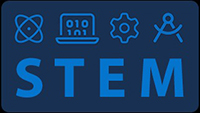
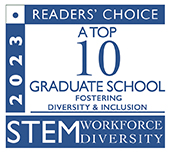

Admissions Requirements
To be considered for admission, applicants are required to complete our online graduate application and submit the following materials:
- Required application fee ($75, waivers available)
- Personal statement (750-1000 words)
- Resume
- Official academic transcripts
- Letters of recommendation
In addition to the general University requirements for admission to graduate studies, the Department of Biological Sciences has additional general admissions requirements.
Deadlines
Priority Consideration
-
Fall Semester
March 15
-
Spring Semester
September 15
Applications for the M.S. in Molecular Bioscience program are accepted on rolling basis; however, applicants should keep the above timelines in mind to receive priority consideration for admission, teaching assistantships, and scholarship opportunities.
Curriculum Overview
As a foundation, students start with foundational coursework on biostatistics and biology. From there, students can continue a general course of study, or have an option to concentrate in microbiology or neuroscience.
Based on their pathway, students select either a laboratory-based experience (with research thesis) or a coursework-oriented experience (with a library thesis).
Courses cover a broad spectrum of disciplines including genetics, cell and developmental biology, microbiology, molecular biology, pharmacology, toxicology, molecular ecology, immunology and bioinformatics.
Concentration in Microbiology
- Cell Culture Techniques
- Molecular Virology
- Microbial Physiology
- Immunology
Concentration in Neuroscience
- Fundamental of Neuroscience
- Recombinant DNA Technology
- Neuroendocrinology
- Methods in Neuroscience
-
3
Track Options
-
2
Concentrations
-
1
State-of-the-Art Science and Technology Center
Career Opportunities
With tracks in neuroscience, microbiology and business, graduates can move into advanced research roles in biotechnology or the pharmaceutical industries – or combine scientific expertise with business acumen to drive innovations in clinical and health fields.
Plus, New Jersey's renowned pharmaceutical industry, dense with leading firms such as Bristol Myers Squibb and Johnson & Johnson, employs graduates into roles centered on innovative research, drug development and vaccine formulation. Being close to this pharmaceutical and biotechnology hub, Seton Hall offers unique networking, internship and employment opportunities, which are invaluable for those aiming for a versatile and impactful career.
Beyond the commercial sector, the degree can also pave the way for a career in academia and research. Students can pursue teaching roles at secondary or post-secondary levels or even further their studies towards a Ph.D., with the eventual goal of becoming faculty members, researchers, or administrators within academic institutions.

280,000+
National Employment Opportunities in the Life Sciences Industry by 2033 (JobsEQ and BLS)
86.5%
Increase In Earnings For Graduates with an Advanced Degree (National Association of Colleges and Employers)
$69,000
Average Starting Salary for Those with a Master’s Degree (National Association of Colleges and Employers)
Our alumni work at the best businesses around the world.
Our Faculty and Students
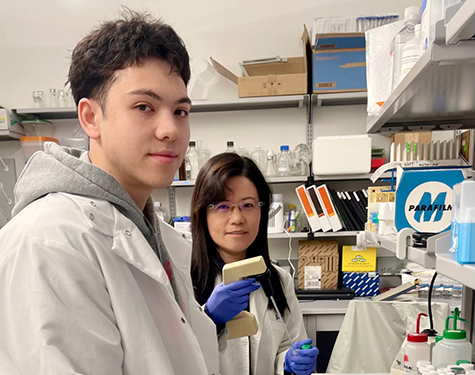
Seton Hall Faculty and Biology Student Use Undergraduate STEM Research Award to Study Antibacterial Properties of Green Tea

Biology Chair, B.S./M.D. Student Study Vape Juice Effects on Cartilage Growth
Scholarships & Financial Aid
Seton Hall University is committed to providing students with the most current information on how to finance your graduate degree. A graduate degree is within your reach – a variety of options can help you finance your degree including scholarships, federal aid, graduate assistantships, and more.
Teaching assistantships and research assistantships, which include tuition benefits and a stipend, are also available on a competitive basis.
-
50%
Amount Scholarships Can Reduce Cost of Degree
Frequently Asked Questions
What is the admissions deadline for the M.S. in Molecular Bioscience program?
Applications for the M.S. in Molecular Bioscience program are accepted on a rolling basis. However, applicants are encouraged to apply by March 15 for the Fall semester and September 15 for the Spring semester for priority consideration for admission, teaching assistantships and other scholarship opportunities.
In addition to the general University requirements, what are the additional Department of Biological Sciences requirements for the M.S. in Molecular Bioscience program?
In addition to the general University requirements for admission to graduate studies, the Department of Biological Sciences requires:
- A B.S. in a biological science or related science with a GPA of 3.0 or above, which
includes:
- Minimum of 24 credits in biology including general biology, cell biology and molecular genetics
- 16 credits in general chemistry and organic chemistry with adequate laboratory time
- 8 credits of physics with laboratory
- 8 credits in mathematics beyond precalculus
- Graduate Record Examination (GRE) scores (minimum 50th percentile, general exam) are required for all applicants whose degrees were earned at institutions outside the U.S. A request for waiver of the GRE may be submitted if the undergraduate GPA (B.S. biological science) from a U.S. institution was 3.0 or better, on a 4.0 = A scale.
- Résumé and personal statement describing candidate’s scientific background, including previous laboratory training from coursework or work experience, and career goals
- Three letters of recommendation
International students must provide proper immigration documents and a TOEFL score equal to 75% of the maximum possible score. For all degrees from institutions outside the U.S., a World Education Service (WES) assessment of the transcript is required.
Where can I access additional FAQ's?
Additional Resources
Dual Degree (B.S./M.S.)
International Graduate Applicants
STEM Connect
Request More Information
Loading M.S. Molecular Bioscience ...
About Seton Hall


One of the country's leading Catholic Universities, Seton Hall University has been developing students in mind, heart and spirit since 1856.
Home to over 10,000 undergraduate and graduate students and offering more than 90 undergraduate programs and over 130 graduate programs, Seton Hall's academic excellence has been singled out for distinction by The Princeton Review, U.S. News & World Report and Bloomberg Businessweek.
Seton Hall's 58-acre campus in the quaint town of South Orange, New Jersey, is only 14 miles from New York City — offering students a wealth of employment, internship, cultural and entertainment opportunities. The University’s nationally recognized School of Law is located in nearby Newark, New Jersey. The Interprofessional Health Sciences (IHS) campus in the owns of Clifton and Nutley, New Jersey, houses the University’s College of Nursing and School of Health and Medical Sciences.
-
14
Miles from New York City
-
90+
Career-Building Graduate Programs


